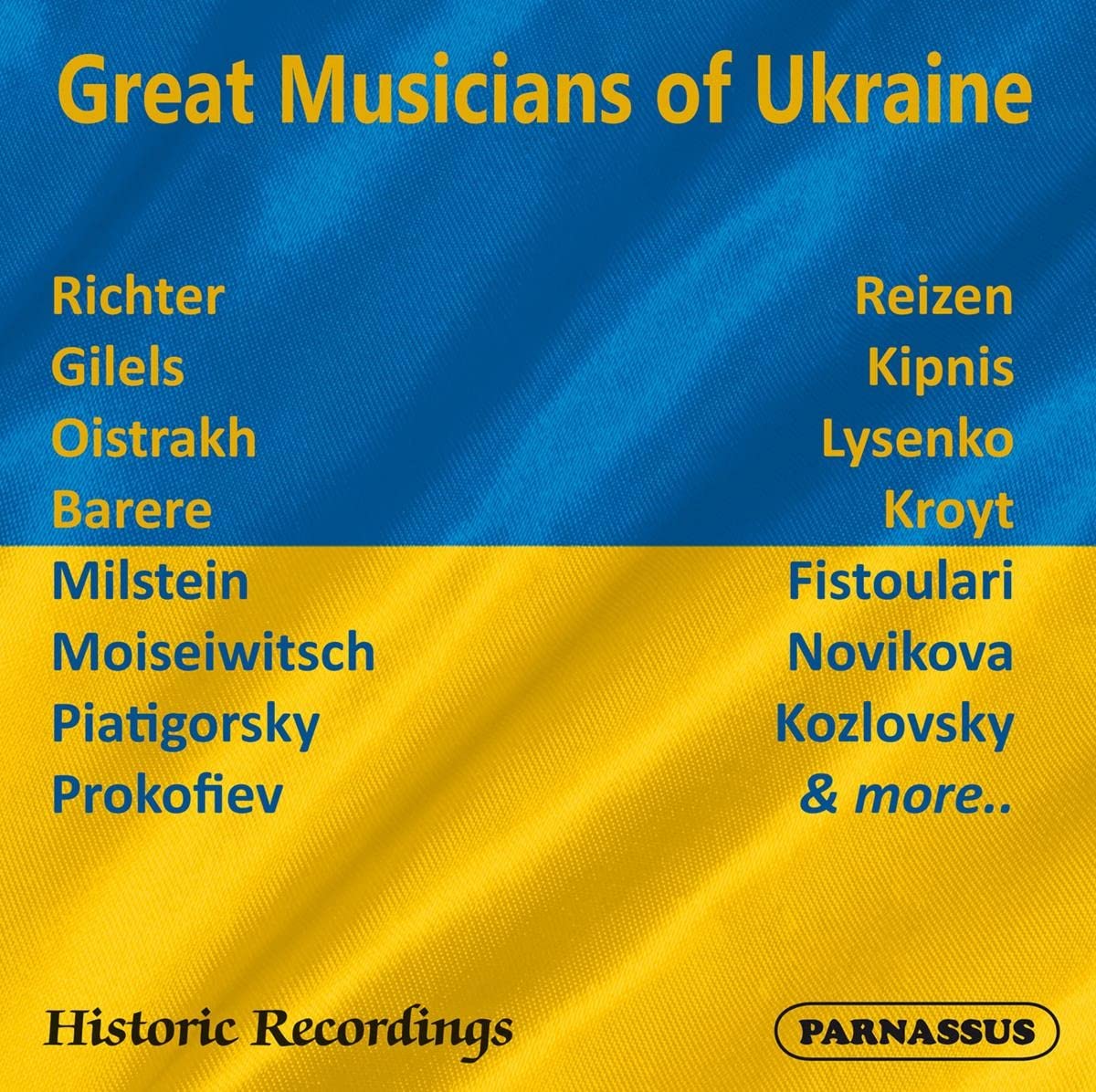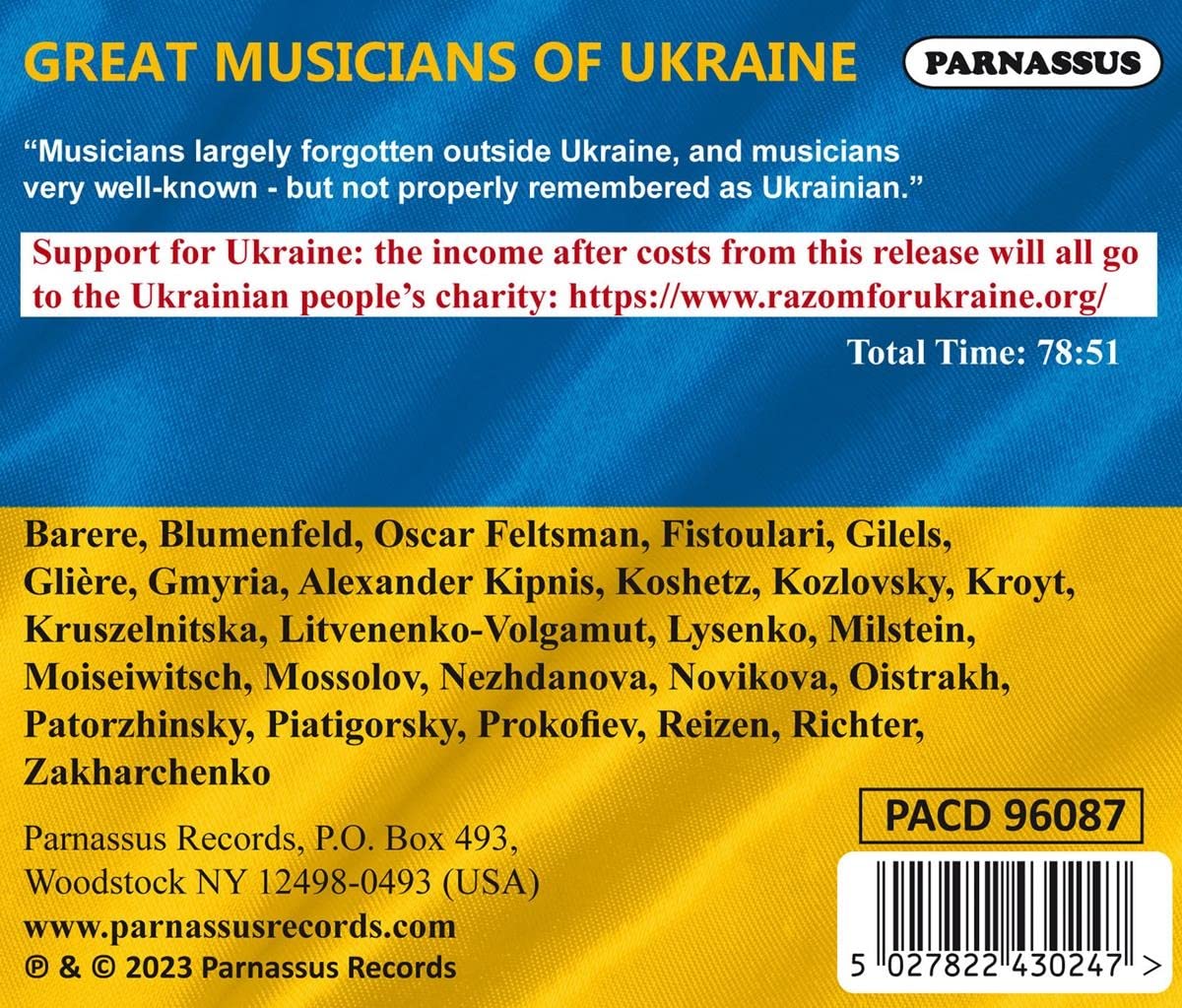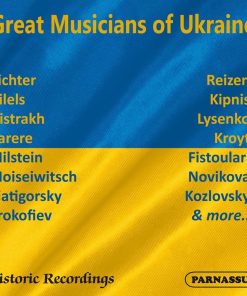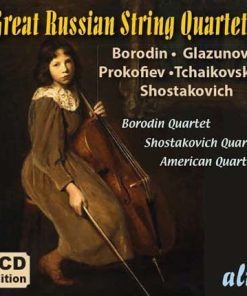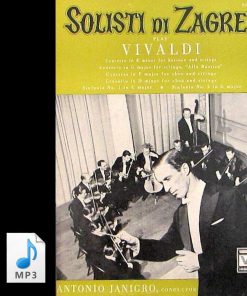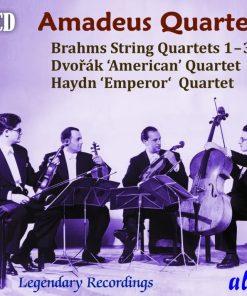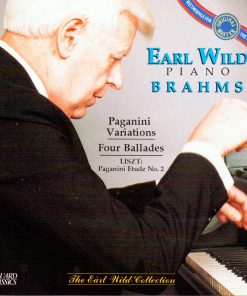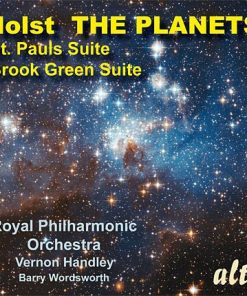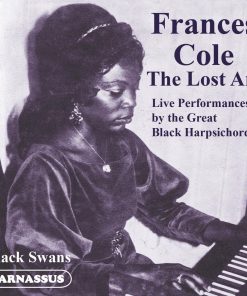GREAT MUSICIANS OF UKRAINE (DIGITAL DOWNLOAD) PARNASSUS
$ 3,99 $ 2,39
YOUR ENTIRE PURCHASE PRICE WILL BE DONATED TO RAZOM FOR UKRAINE (https:///s/files/1/0067/4660/3571/files/officialtracklistingwithworld_b79a4887-e333-4cca-a4b2-e2b81d298cf5_480x480.png?v=1681155905″>
[1] Ryda Lysenko, piano: Lysenko: Intermezzo for Piano in F, Op.8/2 2:55USSR 3640/1; 1957[2] Simon Barere, piano: Blumenfeld: Etude for Piano, Left hand,
in Aflat, Op.36 HMV 2EA 24311 DB 2646 Oct. 7, 1935 3:53[3] Benno Moiseiwitsch, piano: Rubinstein. Barcarolle for Piano
in F minor, op.30 no.1; HMV Cc 14662 D676 June 6, 1922 4:15[4] Announcer. Suggestion diabolique announcement 0:21[5] Serge Prokofiev, piano: Suggestion diabolique. Op.4 no.4 2:24
broadcast transcription Parnassus PACD 96073 Jan.16, 1937[6] Sviatoslav Richter, piano: Prokofiev. Rondo for Piano, Op.52 no.2 4:55
Parnassus PACD 96025 April 4, 1952[7] Emil Gilels, piano: Prokofiev.Piano Sonata No.3, A min, op.28 (1/84) 8:22[8] Gregor Piatigorsky, cello; Valentin Pavlovsky, piano:
Prokofiev. Romeo and Juliet, op.64 /12, Masques (arr. Piatigorsky) 2:24
Columbia co 314561 17307D 1945/1946[9] Boris Kroyt, viola; Ilonka von Pathy, piano: Chopin. Nocturne No.19
in E min, Op.72/1 (arr.Auer) Parlophone 25897 & P1371 May 13, 1922 3:50[10] Nathan Milstein, violin; Leopold Mittmann, piano: Stravinsky.
Firebird – Berceuse (arr.Dushkin) Columbia co228052, 11715D (1940/1) 3:03[11] Anatole Fistoulari / London Philharmonic Orchestra: Glière: Red
Poppy, Ballet, op.70/No.14. Russian Sailor’s Dance 3:39
RCA RB16049 / LM2133 1957[12] Nina Koshetz, soprano; Boris Lang, piano: Trad: Ol’ Mamo (in
Ukrainian) Brunswick 8909 15055 October, 1922 2:45[13] Mark Reizen, bass; Alexander Orlov /AllUnion Radio Orch.
Lysenko. Taras Bulba- When I am Weakened by the Years (in Ukr) 3:04
USSR 1940 [14] Antonina Nezhdanova, soprano; Ivan Kozlovsky, tenor; Nicolai
Golovanov, piano: Gounod. Romeo et Juliette – on, ce n’est pas
le jour (in Russian) USSR 08952/3 1939 3:55
Alexander Kipnis, bass; Wolfgang Rose, piano: (3) Shostakovich Songs :[15] Op.62: # 5 Shakespeare Sonnet no.66 (in Russian) 3:34[16] Shostakovich Op.62 Song (in Russian) (title not made evident) 0:58[17] The Grand Duke of York. op.62 # 6 (in Russian) 0:50
above 3 Lacquer transcriptions from “Invitation to Music” Aug. 31, 1942[18] Ivan Kozlovsky, tenor; Boris Gmiria, Baritone (unaccompanied)
Trad. Ukranian: O You Dnieper (in Ukr) USSR 28128/9 1957 3:01[19] Natalia Zakharchenko, soprano; Andrei Ivanov, bass;
Naum Walter, piano: Lysenko: When Two Separate (in Ukr) 2:45
USSR 12693/4 1945[20] Salomea Kruszelnitzka, soprano; with orchestra: Trad. Vivtsy
moi (in Ukrainian) Columbia W 1088872 27132F Feb, 1928 3:08[21] Maria Litvenenko-Volgemut, soprano; Ivan Patorzhinsky, bass;
Vladimir Yorish/Kyiv Theater Orch. HulakArtemonsky, Semen: Zaporizhian
Cossacks – Odarka & Karas Duet (in Ukr) USSR 8655/6 1950 5:08[22] Oscar Feltsman, vocal & piano: Feltsman: Chernoe more moe 2:34
(in Ukrainian) Nikitin CD 695/09 issued 2009[23] David Oistrakh: Prokofiev: March from Love for Three Oranges 1:31
with Vladimir Yampolsky (piano) Supraphon 10” LPM237, 1959[24] Mossolov. Iron Foundry / Julius Ehrlich / Orchestre Symphonique
de Paris: Columbia E 301912 P17120D1933 2:56[25] Klavdya Novikova, soprano & G. FuchsMartin /AllUnion
Radio Orchestra: N. Lambelet: [used in Sidney Jones’ “The Geisha.”] –
‘I Can’t Refrain from Laughing’ (in Russian) USSR 10457/8 1940 2:37
As the Western world has only recently realized, Ukraine has had its own cultural and national identity for centuries, but for most of that time has been under the colonial rule of Russia. Even now, data entries for many Ukrainians give their birthplace as “Russian empire.” We have chosen to classify as Ukrainian any musicians born in Ukraine, even if they were trained in Russia or elsewhere. Most will be as surprised
as us to discover that such well-known musicians as Gilels, Kipnis, Milstein, Oistrakh, Prokofieff and Richter were born in Ukraine and some grew up and were trained in their native country.
Mykola Lysenko: born in 1842 in Hrynky, Ukraine, under foreign control. His family was wealthy and educated. After taking early piano lessons with his mother, he was brought aged 9 to Kyiv, where he studied until 1867. He then went to Leipzig Conservatory, where he continued studies until 1869, then returning to Kyiv; “He returned home a committed musical nationalist” –Richard Taruskin. Lysenko
was not only a composer of substance and outstanding pianist but also a pioneering musicologist; three decades before the work of Bartók, he began an extensive collection of Ukrainian folk music, transcribing and arranging. He died in Kyiv in 1912. Lysenko’s work has never been forgotten in Ukraine but deserves revival throughout the music world. A brief piano work is played here by his granddaughter Ryda
Lysenko, who taught at the National Music Academy of Ukraine into her 90s.
Felix Blumenfeld was born in Kirovograd in 1863. He studied composition at St. Petersburg Conservatory under Rimsky-Korsakov and also piano, becoming a piano teacher there after his graduation. He was also active as a conductor, particularly of opera. He died in Moscow in 1931. Unfortunately he seems to have made no recordings but he left numerous compositions published and recorded. Among his pupils were Vladimir Horowitz and Simon Barere, born in Odesa in 1896. Barere was Blumenfeld’s favorite pupil. He graduated from the St. Petersburg Conservatory but then returned to Ukraine to teach at the Kyiv Conservatory. After the Russian Revolution Barere lived briefly in Germany and Sweden before settling in the United States. His 78s for HMV and LPs for Remington, in addition to some live performance recordings, reveal him as a sensitive musician and one of the great piano technicians of all time. He died suddenly in 1951 while performing at Carnegie Hall.
Benno Moiseiwitsch 1890-1963, Born in Odesa, began studies with Dmitry Klimov at the Odesa Music Academy at the age of 7. He Studied later in Vienna before moving to England in 1908, where he was based for most of his life.
Sergei Prokofieff was born in Odesa in 1891. (This transliteration “Prokofieff” follows the usage of the musicologist Richard Taruskin.) There he began piano studies with his mother, who spent two months a year studying piano in Russia. He remained until 1904, studying composition with the Ukrainian composer Reinhold Glière, until he met Glazunov, who urged him to apply to Moscow Conservatory. During the Russian Revolution Prokofieff went to Western Europe and spent several years in the United States, but he eventually returned to Russia and died there in 1953. Although remembered today as a major composer, Prokofieff was also a virtuoso pianist, which we know from an hour of recordings.
Sviatoslav Richter was born in Zhytomyr, Ukraine, in 1915. The family was separated during the First World War, but Richter’s father returned to Odesa in 1921. He was basically self-taught, accompanied singers at the Odesa Opera, and gave his first recital in 1934 in Odesa, beginning formal studies with Heinrich Neuhaus at the Moscow Conservatory in 1937. (Neuhaus told others that Richter was ‘the genius pupil’ to whom he had been able to teach ‘almost nothing.’) Aside from being considered among the greatest pianists of his or any time, Richter also played an amazingly large and varied repertoire from Handel to Shostakovich and even including Berg and Webern. He became close to Prokofieff, who dedicated the great Sonata No.7 to him. After touring the world, he died in Russia in 1997.
Emil Gilels was born to a Jewish family in Odesa in 1916. His studies began in Ukraine, with a well-known teacher, Yakov Tkach. In 1929, at 12, Gilels gave his first concert and was admitted to Odesa Conservatory. After winning a competition in 1933 he became known throughout the U.S.S.R and did a concert tour, but found it too stressful and returned to Odesa to continue his studies. Only in 1935 did he attend Moscow Conservatory, where he too studied with Neuhaus. Gilels also became close to Prokofieff, who dedicated his Sonata No.8 to him. He was the first Soviet pianist to tour the U.S.A. He died in 1985. His performance of Prokofieff’s Sonata No.3 shows unique insight into the music.
Gregor Piatigorsky was born in 1903 in Ekaterinoslav Ukraine (now Dnipro). He received his first music lessons in violin and piano from his father. He decided to learn the cello when he first heard one at the age of 7, when his parents gave him one. He won a scholarship to the Moscow Conservatory when still a child. He earned money playing in cafes, then became a member of a string quartet at 15. At 18, after
he had escaped from Russia, he studied in Berlin until Furtwängler heard him in a café and hired him to become principal cellist of the Berlin Philharmonic. He first toured the United States, as a soloist, in 1929, eventually settling in a small town in the Adirondacks and teaching at the Curtis Institute in Philadelphia. His career as a soloist led to many recordings and to his association with Jascha Heifetz, first in private sessions, later in the Heifetz-Piatigorsky Concerts. He died in Los Angeles in 1976.
Boris Kroyt was born in 1897 in the Jewish ghetto of Odesa, where his parents hosted meetings of young radicals including Leon Trotsky (also Ukrainian). His talent was recognized early and he studied at the Imperial Music College of Odesa. At 10 he gave a concert in Odesa to raise money for his studies, attracting an audience of a thousand. After graduating from the Stern Conservatory, Berlin, Kroyt began a successful career as a violin soloist and member from 1927 of the original Guarneri Quartet. He joined
the Budapest Quartet in 1936, followed the ensemble to the United States, and played with the ensemble until it disbanded in 1967. He died in New York in 1969. His scarce solo recording was made in 1922.
Nathan Milstein was born in Odesa in 1904. His parents had no musical background but on hearing Jascha Heifetz play in 1915 they decided to give Nathan lessons to keep him out of trouble. His progress was so great that at 11 Leopold Auer invited him to study at St. Petersburg Conservatory. Milstein went on to become known as one of the world’s greatest violinists, playing at his best until he was in his eighties.
He died in London in 1992. Milstein often played in his early days with his Ukrainian colleague Vladimir Horowitz, who was born in Kyiv in 1903 and died in New York in 1989. Horowitz was one of the major pianists of the 20th century; his many recordings remain widely available.
Anatole Fistoulari was born in Kyiv in 1907. His main teacher was his father, Gregor. At the age of 7 Anatole conducted Tchaikovsky’s Pathétique in Kyiv. He also conducted as a child in Odesa. He traveled to Bucharest at 13 and went on to tour Europe and the U.S.A in opera and ballet. He eventually settled in England and died there in 1995. Fistoulari’s recordings were mostly of Russian music, ballet, and opera. Here he leads a famous excerpt from the work of Ukrainian composer Reinhold Glière.
Nina Koshetz was born in Kyiv in 1891. Her father was an operatic baritone. She studied at Moscow Conservatory from 1908-13, where her teachers included pianist Konstantin Igumnov and composer Sergei Taneyev. In France, she studied with Felia Litvinne. For a time she toured with Horowitz as her accompanist, then in 1920 with the Ukrainian Republic Capella, conducted by her uncle Oleksandr Koshyts. She traveled to Chicago, and joined the Opera Association, singing in the premiere of Prokofieff’s Love for Three Oranges. She toured internationally until 1940, when she became a voice
coach with small roles in movies. She died in California in 1965. Her daughter Marina was also a soprano.
Mark Reizen was born in 1895 into a Jewish family in Zaitsevo village, Ekatirinoslav/Dnipro oblast. After serving in World War I, he studied voice at Kharkiv Conservatory 1919-20, making his debut at Kharkiv Opera in 1921. He joined the Maryinsky in 1925, moving to the Bolshoi in Moscow in 1930, also touring Western Europe. In 1967 he began teaching at the Gneissen Institute in Moscow. He
gave a full recital for his 80th birthday and for his 90th sang the role of Prince Gremin in ‘Eugene Onegin’ at the Bolshoi. He died in Moscow in 1992.
Antonina Nezhdanova was born in 1873 in Kryva Balka, near Odesa. She entered the Moscow Conservatory in 1899, graduating and joining the Bolshoi in 1902. She also sang at the Maryinsky in St.Petersburg and in Odesa and Kyiv. She taught in Moscow, where she died in 1950.
Ivan Kozlovsky was born in the Ukrainian village of Marianivka near Kyiv in 1900. His studies and early performances took place in Ukraine; joining the Bolshoi in 1926. He eventually sang more than 50 lead roles there, also toured widely within the U.S.S.R, but was never allowed to perform elsewhere. He became one of the most famous tenors in Russia and continued to sing occasionally in public until he was 85. He died
in Moscow in 1993. He was a lifelong advocate of Ukrainian music, performing and recording Ukrainian art songs and folksongs. and financing the building of a music school in Marianivka. The singers are accompanied by Nezhdanova’s husband, the Moscow-born conductor Nikolai Golovanov.
Alexander (or Aleksandr) Kipnis was born in Zhytomyr (as was Richter) in 1891, to a Jewish family. As a child he sang in synagogues and performed in a Yiddish theatre group, entering the Warsaw Conservatory aged 19. He studied trombone and double bass until a choir director recommended he go to Berlin to study voice. Held as an alien in a prison camp in World War I, he was heard singing by an army captain, who had him released. His early career was in Germany, but in 1923 he came to America
on tour and joined the Chicago Opera. His international career flourished until the Anschluss, after which he settled in U.S.A, sang at the Met, and became an American citizen. His international career resumed after the war. He retired from the Met in 1946, He died in Westport, Connecticut in 1978, having been one of the great bass singers of the century. His son Igor became a great harpsichordist.
Boris Gmyria (Borys Hmyria) was born in 1903 in the village of Lebedyn, Ukraine. He studied engineering in Kharkiv, graduating from the Kharkiv Conservatory only in 1939. He sang at the Shevchenko Theater in Kyiv as well as in Russia. His repertoire always included both Russian and Ukrainian songs, and he recorded numerous Ukrainian songs. He died in Kyiv in 1969.
Natalia Zakharchenko, 1907-1992, soloist at Kyiv Opera, 1931-55, Professor at Kyiv Conservatoire 1953-1992.. She made at least two 78s of Ukrainian songs there in the 1930s. Andrei Ivanov was born in 1900 in Liublianskia, Ukraine. He sang with Kyiv and Odesa Operas, etc, from 1925, and joined the Bolshoi in 1950. He made numerous recordings. He died in 1970.
Salomea Kruszelnitska was born in 1872 in a village now known as Biliavyntsi. Her family, led by her father, a Ukrainian Greek Catholic priest, settled near Ternopil. She studied there and at Lviv Conservatory. She performed in 1892 in Handel’s “Messiah” before her opera debut in 1893 at Lviv City Theater in 1893. She financed further vocal studies in Italy by singing at Lviv Opera. She married an Italian lawyer in 1910 and continued to sing around Western Europe, especially in music of recent or
contemporary composers (Wagner, Strauss). After her husband died in 1939, she returned to Kyiv, where successive occupations by Germany and Russia left her unable to leave. She died there in 1952.
Maria Litvenenko-Volgemut was born in Kyiv in 1892. She graduated from Kyiv School of Music in 1912, and began her opera career in Ukraine, before St. Petersburg in 1914. She sang in Kharkiv from 1923-35 and in Kyiv 1935-53, becoming a professor at the Kyiv Conservatory in 1944. She died in Kyiv in 1966. Ivan Patorzhinsky was born in PetroSvystunove in 1896. He graduated from (Dnipro) Conservatory in 1922. From 1925-35 he was a member of Kharkiv Opera, and 1935-60 of Kyiv Opera. He also pursued a concert career. From 1946 he taught at Kyiv Conservatory. Among his many roles were a number in Ukrainian operas including Lysenko’s “Taras Bulba.” He died in Kyiv in 1960.
Oscar Feltsman was born to a family of Lithuanian Jewish descent in Odesa in 1921. His father was a surgeon and also a professional pianist. Oscar began music lessons at age 5, In 1939 he graduated from Stolyarsky Music School, Odesa, then going to Moscow Conservatory where he studied with Shebalin. During World War II he was evacuated, returning to Moscow in 1945. Feltsman wrote popular musical comedies, but his large body of work also includes many concert pieces. He died in Moscow in 2013, after having traveled to the U.S. to visit with his son, Russian-American pianist Vladimir Feltsman.
Alexander Mossolov was born in Kyiv in 1900. The family moved to Moscow in 1904, where his mother sang at the Bolshoi and gave the young composer his first music lessons. His father died in 1905, after which his mother married a successful painter. The family spoke several languages at home and traveled several times to Western Europe. He joined the Red Army in 1917, leaving in 1921 when he went
to study at the Moscow Conservatory with Ukrainian composer Gliere, and later Myaskovsky. His early works were mostly for the piano, on which he was a virtuoso. They were adventurous for their time, as was the short orchestral work which made his international fame, known as ‘The Iron Foundry’ although its original title in Russian translates as “The Factory.” He collected folk songs and did his best to please the Soviet music commissars, but he suffered severe repression, expulsion from the Composers Union in 1936 and actual arrest in 1937. He continued to compose until the end of his life, but his later works are far more conservative than those of his 20s and 30s. He died in Moscow in 1973. The first recording of his ‘big hit’ was made in Paris in 1933. In recent years many of his works have been revived, (NFPMA9978) including some that had been thought lost. Julius Ehrlich (1894-1976) was a German conductor who worked among other places in Leningrad/St. Petersburg. The other side of this original 78 was another ‘futurist’ Soviet composition. Meytuss’s “Dnieper Water Power Station.”
David Oistrakh was born in Odesa in 1908. He began violin studies at age 5 and played in public for the first time in 1914. He studied at the Odesa Conservatory from 1923-26; in 1927 he played Glazunov’s Violin Concerto in Kyiv with the composer conducting. He taught at Moscow Conservatory, touring widely including Helsinki in 1949 and other European countries, being the first Soviet artist to play in the
U.S.A in 1955. He collaborated with numerous composers; Prokofiev and Shostakovich both wrote for him. He also conducted widely. He died in Amsterdam in 1974.
Klavdya [Claudia] Novikova was born in Odesa; different sources say 1895 or 1898. She studied with the contralto Evgenia Zbruyeva and in 1920 debuted in Odesa, then later appearing at the Hermitage Theatre inMoscow. Her career developed when she devoted herself to operetta, then in 1926 she joined Moscow Operetta
Theater where she stayed until retirement in 1958. Her record “Song of the laugh” made her famous. She died in 1968.
Deepest thanks to Vladimir Feltsman for providing the recording of his father’s performance, and to all those known and unknown who provided information. Audio restoration by Steve Smolian, Smolian Sound Studios (also provider of many of these recordings).
Produced by Steve Smolian and Leslie Gerber
| CHOOSE YOUR PREFERRED DIGITAL FILE FORMAT | MP3, FLAC, APPLE LOSSLESS, AIFF, WAV |
|---|
Fast Shipping and Professional Packing
Due to our longstanding partnership with UPS FedEx DHL and other leading international carriers, we are able to provide a range of shipping options. Our warehouse staff are highly trained to pack your goods exactly according to the specifications that we supply. Your goods will undergo a thorough examination and will be safely packaged prior to being sent out. Everyday we deliver hundreds of packages to our customers from all over the world. This is an indication of our dedication to being the largest online retailer worldwide. Warehouses and distribution centers can be located in Europe as well as the USA.
Orders with more than 1 item are assigned processing periods for each item.
Before shipment, all ordered products will be thoroughly inspected. Today, most orders will be shipped within 48 hours. The estimated delivery time is between 3-7 days.
Returns
The stock is constantly changing. It's not entirely managed by us since we are involved with multiple parties such as the factory and our storage. The actual stock can fluctuate at any time. Please understand it may happen that your order will be out of stock when the order is placed.
Our policy is valid for 30 days. If you haven't received your product within 30 days, we're not able to issue either a return or exchange.
You are able to return a product if it is unused and in the same condition when you received it. It must also still remain in the original packaging.
Related products
Digital Music Downloads
BRAHMS, DVORAK & HAYDN: QUARTETS – AMADEUS QUARTET (DIGITAL DOWNLOAD) ALTO
Digital Music Downloads
BIG BACH SET, VOL. 3 (10 Hour Digital Download – MP3) BACH GUILD
Digital Music Downloads
BEAUTIFUL HARP – One Hour of Glissando Beauty (DIGITAL DOWNLOAD) BACH GUILD
Digital Music Downloads
BEAUTIFUL MOZART – One Hour of Mozart’s Most Beautiful Melodies (DIGITAL DOWNLOAD) BACH GUILD
Digital Music Downloads
GREAT RUSSIAN STRING QUARTETS (DIGITAL DOWNLOAD BOXED SET) ALTO
Digital Music Downloads
Digital Music Downloads
I SOLISTI DI ZAGREB PLAYS VIVALDI (Digital Download) VANGUARD CLASSICS
Digital Music Downloads
17 JEWELS IN THE CROWN OF THE BAROQUE – CAMERATA OF ST. ANDREW (DIGITAL DOWNLOAD) VANGUARD CLASSICS
Digital Music Downloads
BRAHMS, DVORAK & HAYDN: QUARTETS – AMADEUS QUARTET (2 CDS + FREE MP3) ALTO
Digital Music Downloads
Digital Music Downloads
HAYDN: SYMPHONIES 99-104 – WOLDIKE, VIENNA STATE OPERA ORCHESTRA BACH GUILD
Digital Music Downloads
Digital Music Downloads
Digital Music Downloads
Digital Music Downloads
EARL WILD PLAYS BRAHMS & LISZT (DIGITAL DOWNLOAD) OMEGA VANGUARD
Digital Music Downloads
HOLST: THE PLANETS SUITE; ST PAUL’S SUITE – HANDLEY, ROYAL PHILHARMONIC (Digital Download) ALTO
Digital Music Downloads
Digital Music Downloads
Digital Music Downloads
Digital Music Downloads
Digital Music Downloads
Digital Music Downloads
Digital Music Downloads
INTRODUCING TOBACCO TO CIVILIZATION – 22 COMEDY CLASSICS (DIGITAL DOWNLOAD) ALTO TAKE 2
Digital Music Downloads
IDA HAENDEL & JOSEF HASSID: THE POLISH-JEWISH VIOLIN PRODIGIES (DIGITAL DOWNLOAD) PARNASSUS
Digital Music Downloads
Digital Music Downloads
Digital Music Downloads
Beautiful Bach – One Hour of Bach’s Most Beautiful Melodies (DIGITAL DOWNLOAD) BACH GUILD
